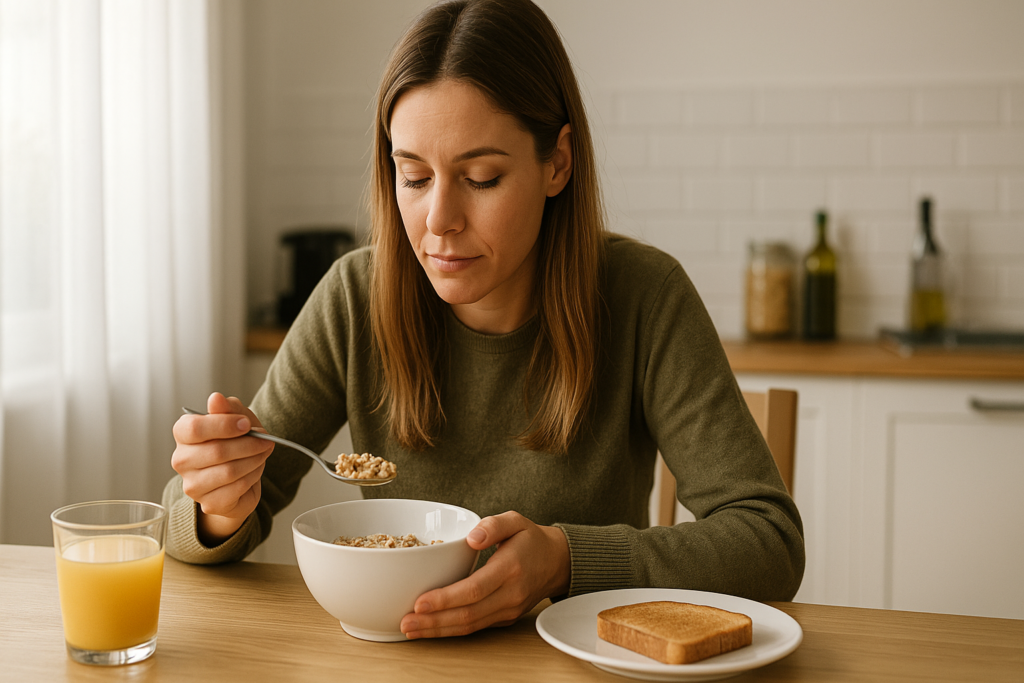“Variety is the spice of life,” the old saying goes—yet millions of us start every morning with exactly the same bowl of oats, the same smoothie, or the same two eggs on toast.
Far from being a dull habit, that choice can reveal a surprising amount about how your mind works.
Research into personality, decision‑making and habit formation shows that repeat‑breakfast eaters tend to cluster around eight psychological traits.
Remember, these are correlations, not destiny, but they offer an intriguing window on the link between what’s on your plate and what’s going on in your head.
1. You score high on conscientiousness and self‑discipline
Conscientious people gravitate toward orderly routines—everything from colour‑coding calendars to keeping a predictable breakfast menu.
A 2022 study in Frontiers in Psychology found conscientiousness was the Big‑Five trait most strongly associated with regularly eating recommended foods and sticking to consistent meal patterns.
Breakfast is particularly sticky: once you’ve formed a reliable morning sequence, it runs on autopilot. Behavioural scientists call this an “implementation intention”—a pre‑planned if‑then script (“if it’s 7 a.m., then I eat Greek yoghurt and berries”) that removes friction and keeps goals like healthy eating effortless.
2.You’re guarding your mental bandwidth against decision fatigue
Roy Baumeister’s research on decision fatigue shows that every choice—no matter how small—depletes willpower. Productivity writers often note that Barack Obama wore the same suit colour and Steve Jobs the same black turtleneck for precisely that reason.
Articles on minimising cognitive load recommend “standardising” low‑stakes choices such as breakfast so the brain is fresh for bigger calls later in the day.
If you pour the same cereal each sunrise, you’re subconsciously conserving executive energy for the negotiations, parenting dilemmas or creative work that follow.
3. You have a strong need for closure (a preference for predictability)
Social‑cognition researchers Arie Kruglanski and Donna Webster coined the term Need for Cognitive Closure—the desire for firm answers and an aversion to ambiguity. High‑NFC individuals sidestep open‑ended decisions by leaning on defaults and routines.
Choosing the identical avocado toast every morning is a textbook closure move: it freezes one variable in a chaotic world. The fewer uncertainties before 9 a.m., the calmer you feel.
4. You’re lower in openness to experience—or a bit food‑neophobic
Openness (one of the Big Five traits) loves novelty. People low in openness, by contrast, prefer the familiar.
Studies using the Food Neophobia Scale repeatedly show that individuals who resist trying new foods also score lower on openness and extraversion.
Sticking to the same breakfast doesn’t automatically make you unimaginative in life—but it does hint that culinary adventure sits lower on your priority list than reliability and comfort.
5. You’re goal‑oriented about health (and you’ve automated it)
Daily breakfast eaters generally have healthier overall lifestyles—greater fruit and vegetable intake, more physical activity and better micronutrient profiles—according to a large review of adult breakfast habits.
Selecting a nutrient‑dense meal and pressing repeat is a classic habit‑stacking strategy: you remove variance that could derail your macros, calorie budget or intermittent‑fasting schedule. In other words, you’ve turned nutritional intentions into a set‑and‑forget system.
6. Routine helps you soothe anxiety
During uncertain times, predictable rituals can buffer stress.
Clinical psychologists note that maintaining regular “primary routines” (sleep, hygiene, meals) stabilises circadian rhythms and lowers anxiety scores.
So if the world feels overwhelming, anchoring the day with an unchanging breakfast can create a small island of certainty—an emotional cue that says, “I know what happens next.”
7. You’re laser‑focused on time efficiency and productivity
Workplace psychologists argue that chaotic mornings spike cortisol and erode focus, whereas simple, purposeful rituals boost mental clarity and conserve cognitive resources for later tasks.
Waking, hydrating and sliding straight into your go‑to muesli therefore isn’t laziness—it’s an optimisation tactic. Each minute saved deciding between toast or granola is a minute you can invest in deep work, a workout or kid‑school prep.
8. You have high grit and perseverance
Angela Duckworth defines grit as sustained passion and perseverance toward long‑term goals.
Psychologists writing in Psychology Today note that establishing “simple, repeatable, mundane routines” is one of grit’s scaffolding behaviours; consistency beats sporadic intensity.
The daily sameness of your breakfast signals that you value sticking with a system over chasing novelty—an attitude that often shows up in marathon training plans, language‑learning streaks or multi‑year entrepreneurial projects.
Putting it all together
None of these traits live in isolation, and correlation is not causation. You might be a conscientious, anxiety‑sensitive entrepreneur on a tight morning schedule—or simply someone who loves Vegemite toast. Still, psychologists agree that repeated micro‑behaviours reflect (and reinforce) deeper cognitive preferences:
| Trait cluster | Pay‑off you’re probably getting |
|---|---|
| Conscientious & health‑focused | Reliable nutrient intake, easier weight control |
| Decision‑fatigue avoidance | Fresher brain for bigger choices |
| Need for closure & anxiety‑buffer | Sense of calm predictability |
| Productivity & grit | Extra time and willpower for long‑term goals |
(Yes, even minimalism can be a performance hack.)
closing thoughts: use the insight, not the label
If you find yourself in these descriptions, celebrate the upside—structure, health, mental clarity. Just watch for the downsides of rigidness: low openness can shrink your palate (and micronutrient diversity), while high need for closure can make you overly inflexible when life throws curveballs.
A mindful way to balance both worlds is the 80/20 breakfast rule: keep your trusty staple 80 percent of the time, and experiment the remaining 20 percent. You’ll still harness the cognitive and emotional benefits of routine while flexing the psychological muscles of curiosity and adaptability.
So tomorrow morning, as you crack those same two eggs or blend that familiar smoothie, know that your breakfast is doing more than fuelling your body—it’s quietly broadcasting the architecture of your mind.







